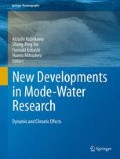Abstract
The mixed layer depth (MLD) front and subduction under seasonal variability are investigated using an idealized ocean general circulation model (OGCM) with simple seasonal forcings. A sharp MLD front develops and subduction occurs at the front from late winter to early spring. The position of the MLD front agrees with the curve where \({\rm D}T_{s}/{\rm D}{t} = {\delta} T_s/{\delta}t\,+\,{u}_g \cdot \nabla T_s = 0\) 0 is satisfied (t is time, u g is the upper-ocean geostrophic velocity, T s is the sea surface temperature (SST), and \(\nabla\) is the horizontal gradient operator), indicating that thick mixed-layer water is subducted there parallel to the SST contour. This is a generalization of the past result that the MLD front coincides with the curve \(u_g\cdot\nabla T_{\rm s}\) when the forcing is steady. Irreversible subduction at the MLD front is limited to about 1 month, where the beginning of the irreversible subduction period agrees with the first coincidence of the MLD front and DT s/Dt in late winter, and the end of the period roughly corresponds to the disappearance of the MLD front in early spring. Subduction volume at the MLD front during this period is similar to that during 1 year in the steady-forcing model. Since the cooling of the deep mixed-layer water occurs only in winter and SST can not fully catch up with the seasonally varying reference temperature of restoring, the cooling rate of SST is reduced and the zonal gradient of the SST in the northwestern subtropical gyre is a little altered in the seasonal-forcing case. These effects result in slightly lower densities of subducted water and the eastward shift of the MLD front.
Access this chapter
Tax calculation will be finalised at checkout
Purchases are for personal use only
Preview
Unable to display preview. Download preview PDF.
References
Fu L-L (2004) Latitudinal and frequency characteristics of the westward propagation of large-scale oceanic variability. J Phys Oceanogr 13:1907-1921
Hasumi H (2000) CCSR report no 13. Center for Climate System Research (CCSR), Chiba
Hellerman S, Rosenstein M (1983) Normal monthly wind stress over the world ocean with error estimates. J Phys Oceanogr 13:1093-1104
Huang RX, Qiu B (1994) Three-dimensional structure of the wind-driven circulation in the subtropical North Pacific. J Phys Oceanogr 24:1608-1622
Kubokawa A (1999) Ventilated thermocline strongly affected by a deep mixed layer: a theory for subtropical countercurrent. J Phys Oceanogr 29:1314-1333
Kubokawa A, Inui T (1999) Subtropical countercurrent in an idealized ocean GCM. J Phys Oceanogr 29:1303-1313
Levitus S, Boyer TP (1994) World Ocean Atlas 1994. NOAA Atlas NESDIS 4, NODC, Washington, DC
Liu Z, Pedlosky J (1994) Thermocline forced by annual and decadal surface temperature variation. J Phys Oceanogr 24:587-608
Luyten JR, Pedlosky J, Stommel H (1983) The ventilated thermo-cline. J Phys Oceanogr 13:292-309
Marshall JC, Jamous D, Nilsson J (2001) Entry, flux, and exit of potential vorticity in ocean circulation. J Phys Oceanogr 31:777-789
Marshall JC, Nurser AJG (1992) Fluid dynamics of thermocline ventilation. J Phys Oceanogr 22:583-595
Nishikawa S, Kubokawa A (2007) Mixed layer depth front and subduction of low potential vorticity water in an idealized ocean GCM. J Oceanogr 63:125-134
Nishikawa S, Tsujino H, Sakamoto K, Nakano H (2010) Effects of mesoscale eddies on subduction and distribution of Subtropical Mode Water in an eddy-resolving OGCM of the Western North Pacific. J Phys Oceanogr 40:1748-1765
Oka E, Suga T (2003) Formation region of North Pacific subtropical mode water in the late winter of 2003. Geophys Res Lett 30:2205. doi:10.1029/2003GL018581
Qiu B, Huang RX (1995) Ventilation of the North Atlantic and North Pacific: subduction versus obduction. J Phys Oceanogr 25: 2374-2390
Qu T, Xie S-P, Mitsudera H, Ishida A (2002) Subduction of the north pacific mode water in a global high-resolution GCM. J Phys Oceanogr 32:746-763
Stommel H (1979) Determination of water mass properties of water pumped down from the Ekman layer to the geostrophic flow below. Proc Natl Acad Sci USA 76:3051-3055
Suga T, Aoki Y, Saito H, Hanawa K (2008) Ventilation of the North Pacific subtropical pycnocline and mode water formation. Prog Oceanogr 77:285-297
Suga T, Motoki K, Aoki Y, Macdonald AM (2004) The North Pacific climatology of winter mixed layer and mode waters. J Phys Oceanogr 34:3-22
Tsujino H, Yasuda T (2004) Formation and circulation of mode water of the North Pacific in a high-resolution GCM. J Phys Oceanogr 34:399-415
Williams RG (1991) The role of the mixed layer in setting the potential vorticity. J Phys Oceanogr 21:1803-1814
Williams RG, Spall MA, Marshall JC (1995) Does Stommel’s mixed layer “demon” work? J Phys Oceanogr 25:3089-3102
Xie S-P, Kunitani T, Kubokawa A, Nonaka M, Hosoda S (2000) Interdecadal thermocline variability in the North Pacific for 1958-1997: a GCM simulation. J Phys Oceanogr 30:2798-2813
Acknowledgements
The authors thank Prof. Hiroyasu Hasumi for offering COCO. Many comments and suggestions from the reviewers were very helpful in improving the manuscript. The numerical experiments were performed on the supercomputer, HITACHI SR8000, at the Information Initiative Center, Hokkaido University. Most of the figures were produced with the GFD-DENNOU Library.
Author information
Authors and Affiliations
Corresponding author
Editor information
Editors and Affiliations
Rights and permissions
Copyright information
© 2011 The Oceanographic Society of Japan and Springer
About this chapter
Cite this chapter
Nishikawa, S., Kubokawa, A. (2011). Mixed layer depth front and subduction of low potential vorticity water under seasonal forcings in an idealized OGCM. In: Kubokawa, A., Xie, SP., Kobashi, F., Mitsudera, H. (eds) New Developments in Mode-Water Research. Springer, Tokyo. https://doi.org/10.1007/978-4-431-54162-2_4
Download citation
DOI: https://doi.org/10.1007/978-4-431-54162-2_4
Received:
Revised:
Accepted:
Published:
Publisher Name: Springer, Tokyo
Print ISBN: 978-4-431-54161-5
Online ISBN: 978-4-431-54162-2
eBook Packages: Earth and Environmental ScienceEarth and Environmental Science (R0)

